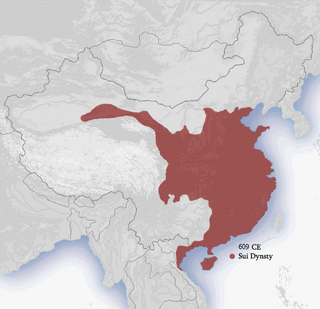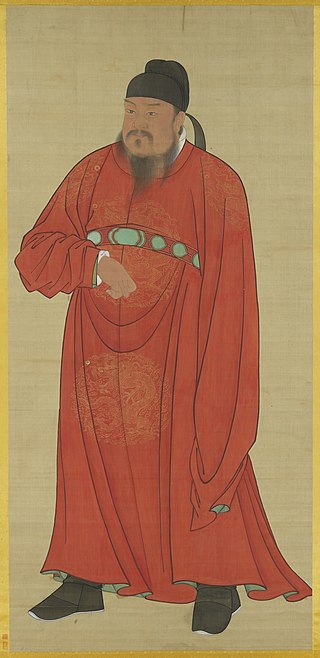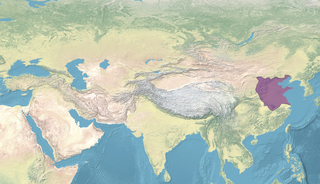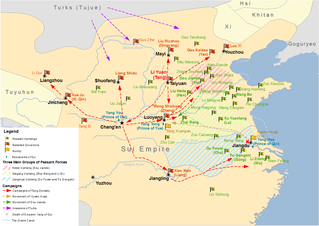
The Sui dynasty was a short-lived Chinese imperial dynasty that ruled from 581 to 618. The re-unification of China proper under the Sui brought the Northern and Southern dynasties era to a close,ending a prolonged period of political division since the War of the Eight Princes. The Sui endeavoured to rebuild the country,re-establishing and reforming many imperial institutions;in so doing,the Sui laid much of the foundation for the subsequent Tang dynasty,who after toppling the Sui would ultimately preside over a new golden age in Chinese history.

Throughout Chinese history,"Emperor" was the superlative title held by the monarchs who ruled various imperial dynasties or Chinese empires. In traditional Chinese political theory,the emperor was the "Son of Heaven",an autocrat with the divine mandate right to rule all under Heaven. Emperors were worshiped posthumously under an imperial cult. The lineage of emperors descended from a paternal family line constituted a dynasty,and succession in most cases theoretically followed agnatic primogeniture. The emperor of China was an absolute monarch.

Emperor Taizong of Tang,previously Prince of Qin,personal name Li Shimin,was the second emperor of the Tang dynasty of China,ruling from 626 to 649. He is traditionally regarded as a co-founder of the dynasty for his role in encouraging his father Li Yuan to rebel against the Sui dynasty at Jinyang in 617. Taizong subsequently played a pivotal role in defeating several of the dynasty's most dangerous opponents and solidifying its rule over China proper.
King Zhuangxiang of Qin,personal name Ying Yiren,Ying Ziyi or Ying Zichu,was a king of the Qin state. He was the father and predecessor of Qin Shi Huang,who would later unify China proper and become China's first emperor. He was posthumously honored as Taishang Huang by the Qin dynasty.

Emperor Gaozu of Tang,born Li Yuan,courtesy name Shude,was the founding emperor of the Tang dynasty of China,reigning from 618 to 626. Under the Sui dynasty,Li Yuan was the governor in the area of modern-day Shanxi,and was based in Taiyuan.

Qi,known as the Northern Qi,Later Qi (後齊) or Gao Qi (高齊) in historiography,was a Chinese imperial dynasty and one of the Northern dynasties during the Northern and Southern dynasties era. It ruled the eastern part of northern China from 550 to 577. The dynasty was founded by Gao Yang,and was eventually conquered by the Xianbei-led Northern Zhou dynasty in 577.
Yang You,also known by his posthumous name as the Emperor Gong of Sui (隋恭帝),was an emperor of the Chinese Sui dynasty. He was installed as a puppet emperor by Li Yuan. After Li Yuan founded the Tang dynasty,he had Yang You executed.
Feng Lun,courtesy name Deyi,better known as Feng Deyi,formally Duke Miao of Mi,was a Chinese official of the Sui and Tang dynasties who served as a chancellor during the reigns of Emperor Gaozu of Tang and Emperor Taizong of Tang. He was praised for his quick thinking but criticized by historians for his being overly attentive to the emperors' desires.
Pei Ji,courtesy name Xuanzhen,formally Duke of Hedong,was an important official and one-time chancellor of the Tang dynasty. He initially served as an official of the Sui dynasty and was one of the driving forces in persuading the general Li Yuan to rebel against Emperor Yang of Sui. He eventually assisted Li Yuan in founding the Tang dynasty as its Emperor Gaozu and was greatly honored in Emperor Gaozu's reign. After Emperor Gaozu's son Emperor Taizong became emperor in 626,Pei began to be accused of corruption and associations with witchcraft and was exiled. Emperor Taizong soon remembered Pei's contributions to Tang's founding and tried to recall him,but Pei died before he could do so.
Empress Zhangsun (長孫皇后,personal name unknown,presumably Wugou,formally Empress Wendeshunsheng or,in short,Empress Wende,was a Chinese essayist and an empress of the Chinese Tang dynasty. She was the wife of Emperor Taizong and the mother of Emperor Gaozong. She was well educated,and her ancestors were of Xianbei ethnicity. Their original surname was Tuoba,later changed to Zhangsun. During her tenure as empress,she served as a loyal assistant and honest advisor to her husband,Emperor Taizong.

The transition from Sui to Tang (613–628),or simply the Sui-Tang transition,was the period of Chinese history between the end of the Sui dynasty and the start of the Tang dynasty. The Sui dynasty's territories were carved into a handful of short-lived states by its officials,generals,and agrarian rebel leaders. A process of elimination and annexation followed that ultimately culminated in the consolidation of the Tang dynasty by the former Sui general Li Yuan. Near the end of the Sui,Li Yuan installed the puppet child emperor Yang You. Li later executed Yang and proclaimed himself emperor of the new Tang dynasty.
Li Yuanji,formally Prince La of Chao (巢剌王),more commonly known by the title of Prince of Qi (齊王),nickname Sanhu (三胡),was an imperial prince of the Chinese Tang dynasty. He was a son of the dynasty's founder Emperor Gaozu of Tang,and in the intense rivalry developed between his older brothers Li Jiancheng the Crown Prince and Li Shimin the Prince of Qin,he sided with Li Jiancheng and often advocated drastic actions against Li Shimin,including assassination. In 626,Li Shimin,fearing that Li Jiancheng and Li Yuanji were about to kill him,laid an ambush for them at Xuanwu Gate outside the palace and killed them. Li Shimin then effectively forced Emperor Gaozu to yield the throne to him.

The Xuanwu Gate Incident was a palace coup for the throne of the Tang dynasty on 2 July 626,when Prince Li Shimin and his followers assassinated his brothers Crown Prince Li Jiancheng and Prince Li Yuanji. Li Shimin,the second son of Emperor Gaozu,was in an intense rivalry with his brothers. He took control and set up an ambush at Xuanwu Gate,the northern gate leading to the Palace City within the imperial capital Chang'an. There,Li Jiancheng and Li Yuanji were murdered by Li Shimin and his men. Within three days after the coup,Li Shimin was installed as the crown prince. About two months later,Emperor Gaozu abdicated and passed the throne to Li Shimin,who would become known as Emperor Taizong.
Pei Ju,birth name Pei Shiju,courtesy name Hongda,formally Duke Jing of Anyi,was a Chinese cartographer,diplomat,politician,and writer who lived in the Sui and Tang dynasties,briefly serving as a chancellor during the reign of Emperor Gaozu of Tang. He was praised by traditional Chinese historians for his ability and lack of corruption,but blamed for flattering Emperor Yang of Sui and practically directly contributing to Sui's downfall by encouraging many external military campaigns that drained Sui's resources. Modern historians have questioned these assessments:Arthur F. Wright labelled the latter judgement in the Zizhi tongjian a "particularly blatant piece of editorializing" and "absurd ... beyond doubt."

Xiao Yu,courtesy name Shiwen,posthumously known as Duke Zhenbian of Song,was an imperial prince of the Western Liang dynasty who later became an official under the Sui and Tang dynasties. He served as a chancellor during the reigns of the emperors Gaozu and Taizong in the early Tang dynasty.
Murong Shun,regal title Zhugulüwugandou Khan (趉故呂烏甘豆可汗) or,in short,Gandou Khan (甘豆可汗),Tang dynasty noble title Prince of Xiping (西平王),was briefly a khan of the Xianbei-led state of Tuyuhun. He would have been expected to be the crown prince of his father,the Busabo Khan Murong Fuyun,as the oldest son of his wife Princess Guanghua of the Sui dynasty,but was bypassed,and in 635,with Tuyuhun under attack by Tang,he headed a group of nobles who surrendered to Tang and was subsequently created khan to succeed his father. However,he did not receive support from his people and was assassinated later that year. He was succeeded by his son Murong Nuohebo.
Prince or King of Yan was a Chinese feudal title referring to the ancient Chinese State of Yan and to its fiefs including the capital Yanjing.
The Battle of Huoyi was fought in China on 8 September 617,between the forces of the rebel Duke of Tang,Li Yuan,and the army of the ruling Sui dynasty. Li Yuan,with an army of around 25,000,was advancing south along the Fen River towards the imperial capital,Daxingcheng. His advance was stalled for two weeks due to heavy rainfall,and he was met at the town of Huoyi by an elite Sui army of 20,000 men. Li Yuan's cavalry,under the command of his two eldest sons,lured the Sui out of the protection of the city walls,but in the first clash between the two main armies,Li Yuan's forces were initially driven back. At that point,possibly due to a stratagem on Li Yuan's behalf,the arrival of the rest of the rebel army,or the flanking maneuver of Li Yuan's cavalry,which had gotten behind the Sui army,the Sui troops collapsed and routed,fleeing back towards Huoyi. Li Yuan's cavalry,however,cut off their retreat. The battle was followed by the capture of weakly defended Huoyi and the advance on Daxingcheng,which fell to the rebels in November. The following year,Li Yuan deposed the Sui and proclaimed himself emperor,beginning the Tang dynasty.







